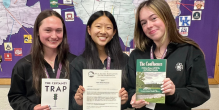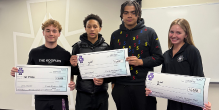History (Class) Repeats Itself - With A Virtual Twist
April 29, 2020
At the end of her Cold War unit, Ms. Morgan Lieske always holds a conference for her sophomore US History students to debate how it started. While this year's conference had to be held online, the format was able to remain almost identical.
Lieske split the class into two, so they each heard about 10 speeches from their classmates on a Google Meets call. She offered extra credit for those that dressed or acted with the demeanor of a historian, so some students showed up for the call wearing a bowtie or a jacket over a t-shirt and sweatpants.
Subscribe to our e-Newsletters
You might also like:
Beyond the Books - June 2025
The latest news from Athletics, Band, Choir, JROTC and Theater.
CDH Juniors Honored with Prestigious Book Awards
Emma Kennefick '26, Annie Fielder '26, and Cecilia Larson '26 received this year’s Harvard, Yale, and Dartmouth Book Awards for their academic excellence, leadership, and character.
Student Entrepreneurs Awarded $5,000 at First Annual VentureNEXT Prize
Cretin-Derham Hall launched its inaugural VentureNEXT Prize Competition on May 22, awarding $5,000 in prizes to student entrepreneurs.




